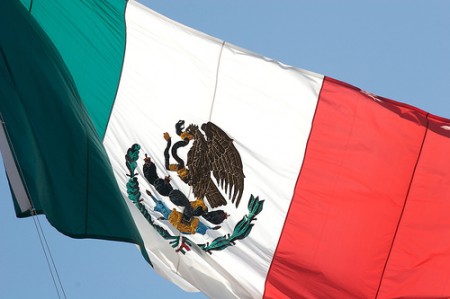
In five weeks from now I will be moving to Mexico.
They say there is no place like home – and indeed, the state of things will be very different from what I know in Switzerland.
People not finding themselves under extraordinary circumstances emigrate because they want a lifestyle that can be best accomplished in their country of destination.
But I guess thoughts about lifestyle and how to best accomplish it would require deeper consideration – especially when it comes to accomplishing it in a country we associate with drug violence, economic problems and …swine flu. I will avoid going deeper and offer simply a brief reflection about the recent Mexican elections.
Has the country reinstitutionalized the revolutionary myth? The Institutional Revolutionary Party (PRI) took power for the first time 80 years ago, enjoyed seven decades of domination, and has now accomplished a successful comeback. Therefore, I cannot help associating the PRI with the country’s authoritarian past.
When I go back and read James M Malloy words from 1977 about authoritarianism in Latin America, I can only hope that the described states of affairs would not still apply today:
“Mexico’s political system is characterized by patrimonially controlled participation exercised by the political elite based on the underlying assumption of privilege rather than right. (…) The decision-making process is legitimated by massive support from precisely those sectors of society that participate least in the distribu¬tion of benefits: labor, peasants, and Indians. For more than forty years the Party (PRI) has maintained this monopoly by preempt¬ing and institutionalizing the revolutionary myth and by creating for itself an image as the key component of an indissoluble trinity composed of Party, government, and political elite.”
However, things have changed during the past 30 years since Malloy’s writings.
To reflect the change, the PRI has given itself a new image, its slogan being: Experiencia probada, nueva actitud – Proven experience, new attitude. Fearing PRI’s victory, current Mexican President Felipe Calderón warned in late June that the country’s democratic future would be at stake. But let’s not exaggerate. Even if the PRI has not changed in substance, Mexico’s political context is very different today and democracy itself is not endangered.
But the July 5th elections, in which Mexicans voted for 500 congressional seats, six governors and 565 mayors, were a proof of the electorate’s disappointment with the political class. It was not political apathy – understood as a state of indifference – that explained the low turnout, but general dissatisfaction. 45 percent of the 77.4 million registered voters abstained. Also, these elections allowed free path to another trend, which does have something to do with the basis of democracy. Six percent of ballot papers were spoiled. A powerful social movement called “Voto Nulo” had urged voters prior to the elections to express their protest against the political class by casting a blank vote. Protest campaigns using means such as blogs and YouTube reflected the broad aversion with the Mexican decision-makers. Then again, with the country facing enormous problems the impression is that there should be no time for rejecting political participation. Blank votes are not known as the best form of political engagement because they do not lead to concrete changes. But there is one thing that the Voto Nulo campaign might have accomplished. It is expected to have opened up the public space for more critical debates and citizen participation.
The elections on the 5th of July mirror the people’s dilemma. On the one hand they are fed up with the centre-right governing party National Action Party (PAN) of President Calderón. The left-wing Democratic Revolution Party (PRD) of populist Andrés Manuel López Obrador does not inspire trust either.
But what else can the recent legislative elections tell us? It is interesting to reflect about their link to the dominant role of the president in a federal presidential republic such as Mexico. Calderón will still be in power for the next three years, until 2012, when the next presidential elections take place. However, these elections have proven to already determine a new favorite candidate for the president’s functions. Enrique Peña Nieto, the state of Mexico governor from the PRI, has become the media face of the elections campaign even though he did not run for any position. The legislative elections served him as a platform to already profile himself as a possible presidential candidate for 2012.
Until the dice have fallen, Felipe Calderón will surely continue with his campaign against the powerful drug cartels, the one sure reason for which he has been applauded. In economic policy he will stay the sorcerer’s apprentice because this time the country’s problems are imported. It will only be with the US and world economy recovering that Mexico will heal too. But while still in power Calderón should keep security as a main priority, with police reform as a major goal.
Adieu Switzerland, hola Mexico. You’ll hear more from me from abroad.

